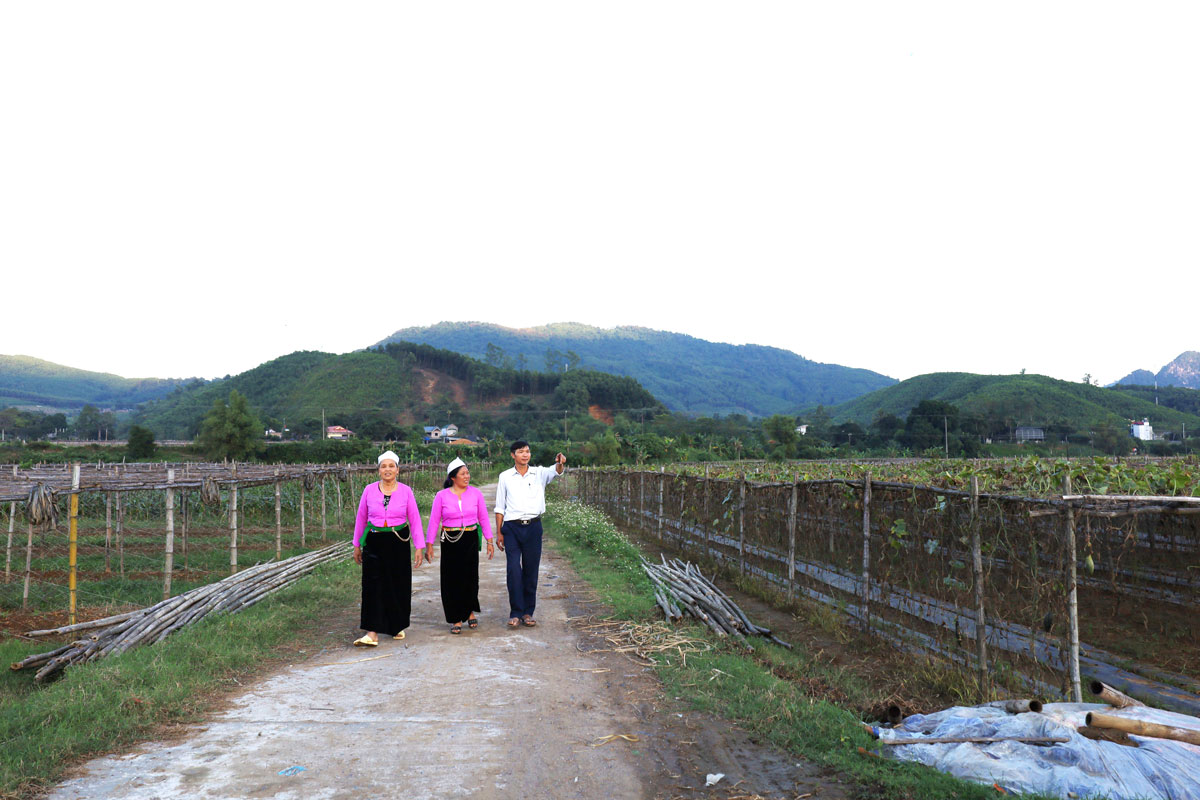
(HBO) - The families of Ms. Quach Thi Hong and Mr. Quach Van Hin in Men Boi village, Kim Lap commune of Kim Boi district have enjoyed a bumper crop of ash gourd in both productivity and price. Hin said that thanks to the concretization of inner-field roads, there is no worry about the post-harvest loss or damage of farm produce. With the average selling price ranging from 14,000 VND (0.61 USD) to 22,000 VND (0.96 USD) per kilogram, his family earned nearly 300 million VND from growing ash gourd.
 The inner-field roads in Men Boi village, Kim Lap commune have been
concretized, facilitating locals’ transport of agricultural products.
The inner-field roads in Men Boi village, Kim Lap commune have been
concretized, facilitating locals’ transport of agricultural products.
Investment programmes and projects designed to support specially difficult areas in the district in the 2019 - 2020 period have
been extended, focusing on developing and upgrading rural roads and
communal houses, and repairing eroded embankments.
A number of key works include a 750m long road in Hop Tien’s Khu village, 450m and
640m of roads in Du Sang commune’s Suoi My
hamlet and Xuan Thuy commune’s Khoang Beo village, respectively, a suspension
bridge in My Hoa commune, and a communal house in Nuong Dam commune. These works help significantly improve local infrastructure conditions, contributing to promoting socio-economic development in ethnic minority areas.
Statistics show that since
2016, 211 infrastructure facilities in the district were constructed and
repaired, including 82 roads and 76 cultural houses for community activities.
In addition, dozens of billions of Vietnamese dong sourced from the National Target Programme on Sustainable Poverty Reduction were spent on upgrading
infrastructure facilities, supporting production development and diversifying livelihoods
for locals.
At the same
time, the district organised a programme to supply rice seeds and hold training
courses on agricultural techniques for local farmers, while providing them with
materials, machinery, fertilizers, plants, and breeders for production.
According to Chairman of the district People’s Committee Bui Van Diep, in 2020,
despite the impact of the COVID-19 pandemic, the political, socio-economic
situation in Kim Boi district remained stable and social security, order and
safety ensured.
The implementation of ethnic affair policies has contributed to promoting
socio-economic development in the locality, with its infrastructure system
upgraded and modernized, and the cultural identities of local ethnic minority
groups preserved and promoted.
As a result,
the living standards of ethnic minority groups have gradually improved and the
rate of poor households has decreased rapidly.
So far, all inter-communal roads in extremely poor areas have been paved with concrete
or asphalt, most schools have been built permanently and social services have
been improved.
Many production models owned by residents in specially disadvantaged areas have
been formed, bringing high economic efficiency.
In 2021, the local authorities will give priority to production development,
vocational training, and job creation, so as to increase income for local
residents. Attention will also be paid to developing infrastructure facilities in specially-disadvantaged
communes and hamlets.
The district aims to increase the income of households participating in the
production development project by 20-25 percent a year, and at least 10 percent
of households participating in projects for escaping from poverty./.
Hoa Binh province is undergoing a dynamic transformation amid Vietnam’s national digital transition. Building on Poliburo’s Resolution No. 57-NQ/TW on breakthroughs in science, technology, innovation, and national digital transformation, the province has rolled out a wide range of practical action plans. A standout initiative is the "Digital Literacy for All” movement, an effort to ensure that no one is left behind in the digital era.
Hoa Binh province is undergoing a dynamic transformation in the wake of the national digital transformation movement. Building on Resolution No. 57-NQ/TW of the Politburo on breakthroughs in science, technology, innovation, and national digital transformation, the province has implemented a wide range of practical action plans. A standout initiative is the "Digital Literacy for All” movement ambitious effort to ensure that no one is left behind in the digital age.
With a spirit of unity and proactive problem-solving, the Party Committee, the government and the people of Dong Lai Commune (Tan Lac District) have made great strides in implementing the resolutions of the 24th Party Congress of the commune for the 2020 - 2025 term. Focusing on leadership and practical actions, the commune has brought the Party’s resolutions into daily life, creating strong impacts and pushing the local development forward.
Amid the nationwide push for digital transformation, young people in Hoa Binh Province are stepping up as dynamic pioneers, applying technology to enhance Youth Union operations and expand the reach of youth-led initiatives. Through creativity and adaptability, Youth Union organizations at all levels have introduced a series of practical solutions, contributing to modern governance and community development.
In recent years, An Nghia commune, located in Lac Son district, has stepped up administrative reform, focusing on improving the quality and efficiency of its single-window service unit for receiving and processing administrative procedures. These improvements have helped create favourable conditions for local residents and organisations to handle administrative procedures, contributing to the commune’s broader socio-economic development.
The Prime Minister-approved master plan to develop the multi-use value of forests ecosystems through 2030, with a vision to 2050, aims to improve the management and sustainable use of forest resources, create jobs, increase incomes, and improve the living standards of ethnic minorities, people in mountainous and remote areas, forest workers and those living near forests.



 The inner-field roads in Men Boi village, Kim Lap commune have been
concretized, facilitating locals’ transport of agricultural products.
The inner-field roads in Men Boi village, Kim Lap commune have been
concretized, facilitating locals’ transport of agricultural products.